Research Methodology: Leadership & Management in Nonprofit Study
VerifiedAdded on 2023/06/14
|10
|3436
|287
Report
AI Summary
This report details the research methodology employed for a study on leadership and management within a nonprofit organization, specifically focusing on volunteer hiring and its implications. The chosen research philosophy is interpretivism, favoring qualitative methods to understand individual beliefs and motivations. The research strategy involves conducting in-depth interviews with leaders, management officers, and volunteers, utilizing purposive sampling to gather detailed data. An inductive research approach is adopted to allow flexibility and context sensitivity. The report further justifies the selection of qualitative research over quantitative, and purposive sampling over other sampling methods, based on the research objectives and available resources. The research design incorporates a survey approach to collect relevant data, while adhering to ethical considerations throughout the process. This document is available on Desklib, a platform offering a wealth of study resources for students.
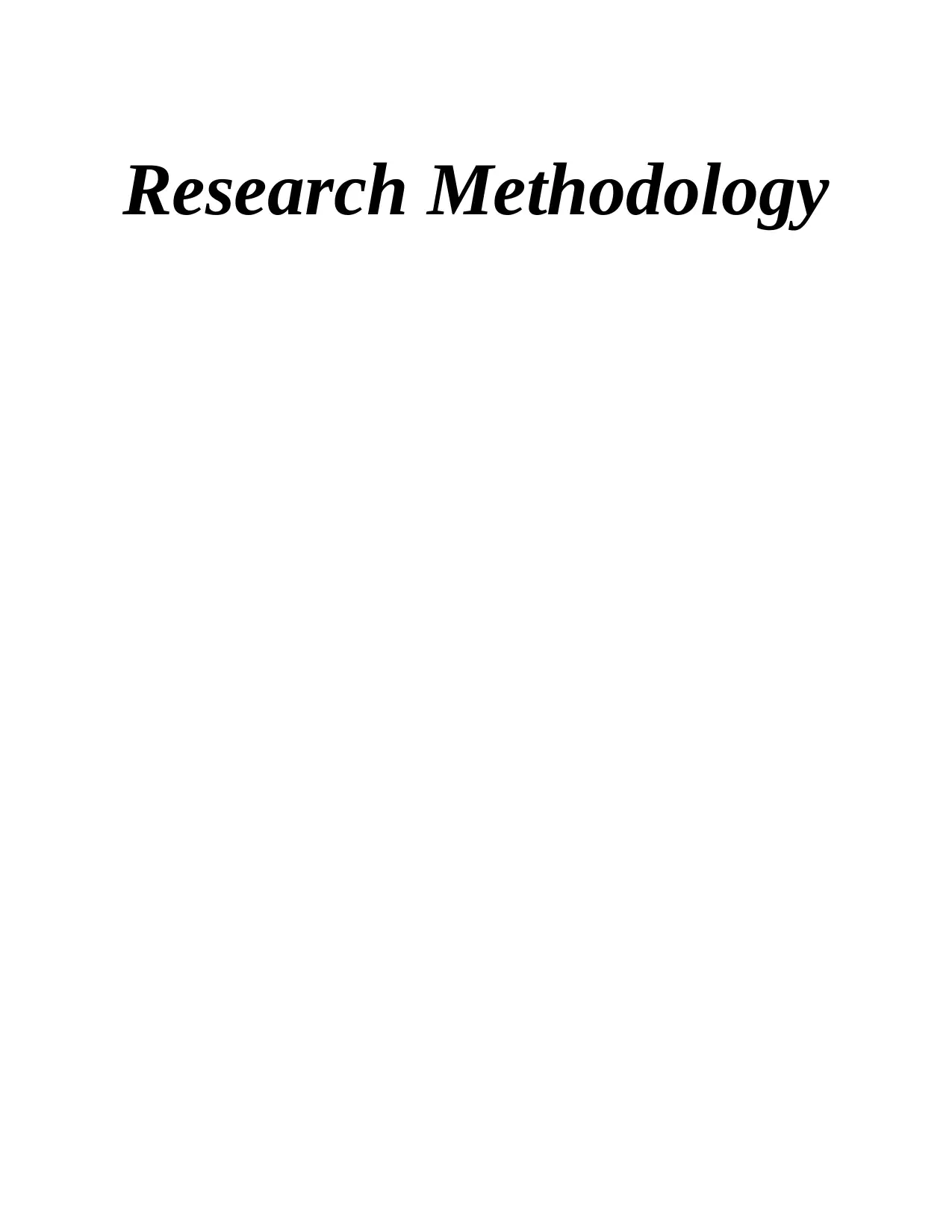
Research Methodology
Paraphrase This Document
Need a fresh take? Get an instant paraphrase of this document with our AI Paraphraser
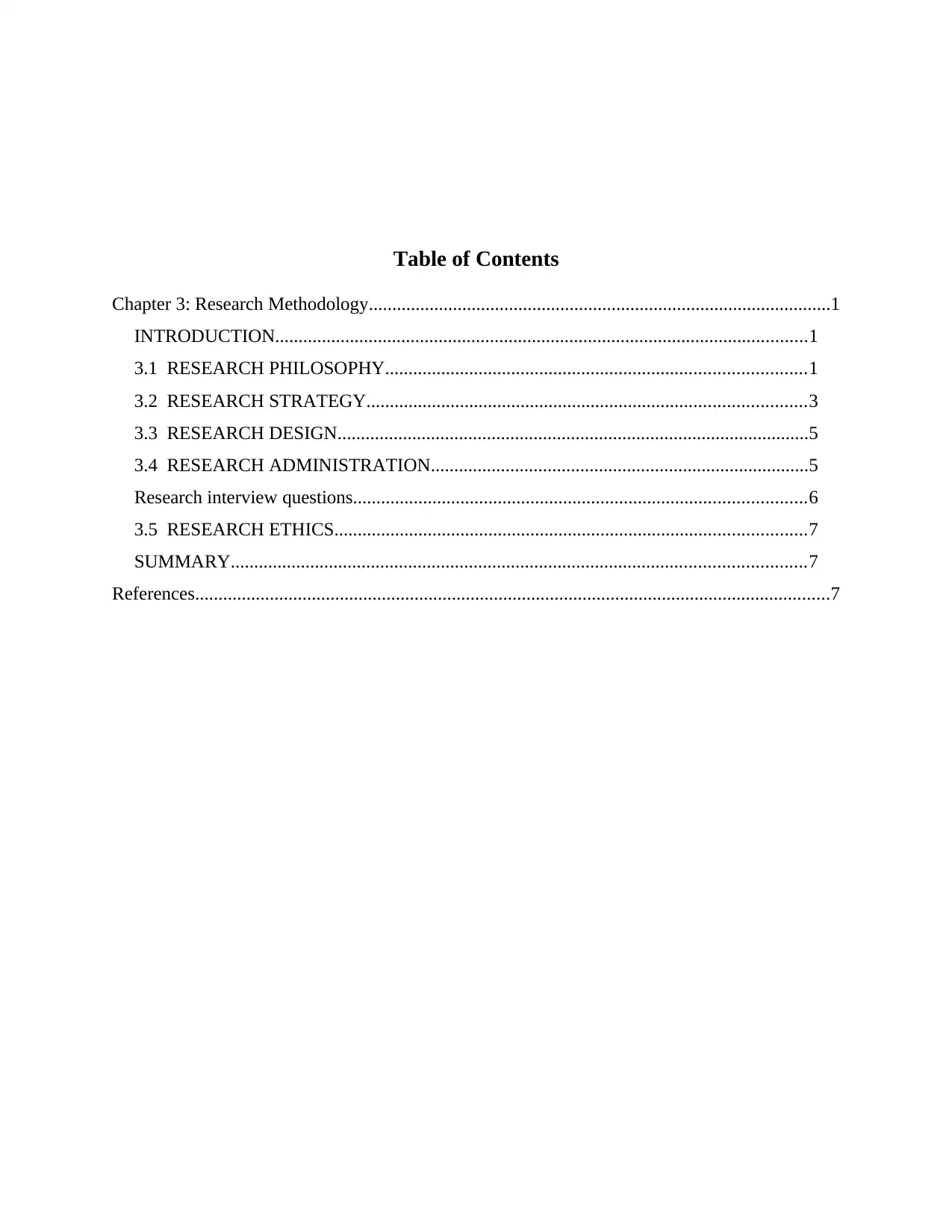
Table of Contents
Chapter 3: Research Methodology...................................................................................................1
INTRODUCTION..................................................................................................................1
3.1 RESEARCH PHILOSOPHY..........................................................................................1
3.2 RESEARCH STRATEGY..............................................................................................3
3.3 RESEARCH DESIGN.....................................................................................................5
3.4 RESEARCH ADMINISTRATION.................................................................................5
Research interview questions.................................................................................................6
3.5 RESEARCH ETHICS.....................................................................................................7
SUMMARY...........................................................................................................................7
References........................................................................................................................................7
Chapter 3: Research Methodology...................................................................................................1
INTRODUCTION..................................................................................................................1
3.1 RESEARCH PHILOSOPHY..........................................................................................1
3.2 RESEARCH STRATEGY..............................................................................................3
3.3 RESEARCH DESIGN.....................................................................................................5
3.4 RESEARCH ADMINISTRATION.................................................................................5
Research interview questions.................................................................................................6
3.5 RESEARCH ETHICS.....................................................................................................7
SUMMARY...........................................................................................................................7
References........................................................................................................................................7
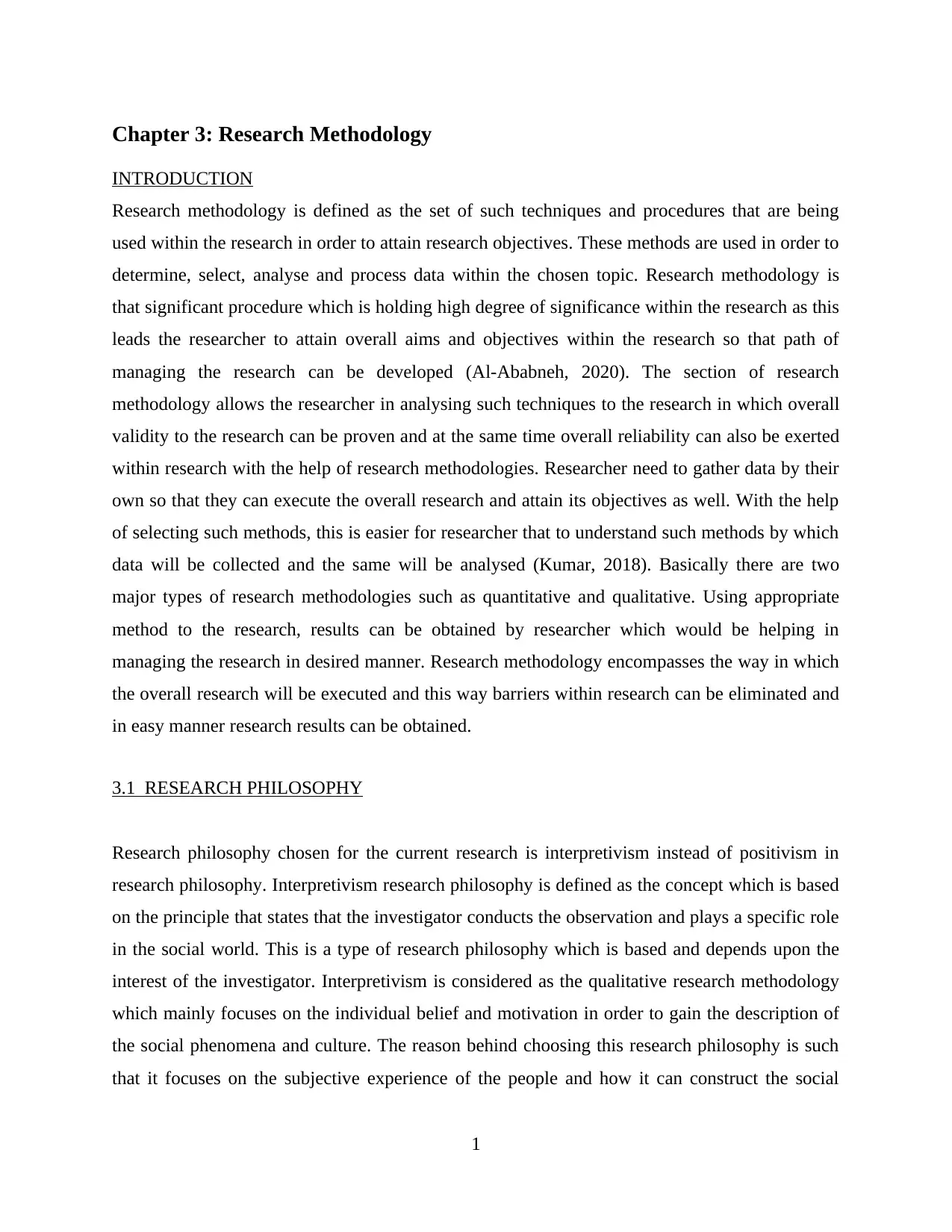
Chapter 3: Research Methodology
INTRODUCTION
Research methodology is defined as the set of such techniques and procedures that are being
used within the research in order to attain research objectives. These methods are used in order to
determine, select, analyse and process data within the chosen topic. Research methodology is
that significant procedure which is holding high degree of significance within the research as this
leads the researcher to attain overall aims and objectives within the research so that path of
managing the research can be developed (Al-Ababneh, 2020). The section of research
methodology allows the researcher in analysing such techniques to the research in which overall
validity to the research can be proven and at the same time overall reliability can also be exerted
within research with the help of research methodologies. Researcher need to gather data by their
own so that they can execute the overall research and attain its objectives as well. With the help
of selecting such methods, this is easier for researcher that to understand such methods by which
data will be collected and the same will be analysed (Kumar, 2018). Basically there are two
major types of research methodologies such as quantitative and qualitative. Using appropriate
method to the research, results can be obtained by researcher which would be helping in
managing the research in desired manner. Research methodology encompasses the way in which
the overall research will be executed and this way barriers within research can be eliminated and
in easy manner research results can be obtained.
3.1 RESEARCH PHILOSOPHY
Research philosophy chosen for the current research is interpretivism instead of positivism in
research philosophy. Interpretivism research philosophy is defined as the concept which is based
on the principle that states that the investigator conducts the observation and plays a specific role
in the social world. This is a type of research philosophy which is based and depends upon the
interest of the investigator. Interpretivism is considered as the qualitative research methodology
which mainly focuses on the individual belief and motivation in order to gain the description of
the social phenomena and culture. The reason behind choosing this research philosophy is such
that it focuses on the subjective experience of the people and how it can construct the social
1
INTRODUCTION
Research methodology is defined as the set of such techniques and procedures that are being
used within the research in order to attain research objectives. These methods are used in order to
determine, select, analyse and process data within the chosen topic. Research methodology is
that significant procedure which is holding high degree of significance within the research as this
leads the researcher to attain overall aims and objectives within the research so that path of
managing the research can be developed (Al-Ababneh, 2020). The section of research
methodology allows the researcher in analysing such techniques to the research in which overall
validity to the research can be proven and at the same time overall reliability can also be exerted
within research with the help of research methodologies. Researcher need to gather data by their
own so that they can execute the overall research and attain its objectives as well. With the help
of selecting such methods, this is easier for researcher that to understand such methods by which
data will be collected and the same will be analysed (Kumar, 2018). Basically there are two
major types of research methodologies such as quantitative and qualitative. Using appropriate
method to the research, results can be obtained by researcher which would be helping in
managing the research in desired manner. Research methodology encompasses the way in which
the overall research will be executed and this way barriers within research can be eliminated and
in easy manner research results can be obtained.
3.1 RESEARCH PHILOSOPHY
Research philosophy chosen for the current research is interpretivism instead of positivism in
research philosophy. Interpretivism research philosophy is defined as the concept which is based
on the principle that states that the investigator conducts the observation and plays a specific role
in the social world. This is a type of research philosophy which is based and depends upon the
interest of the investigator. Interpretivism is considered as the qualitative research methodology
which mainly focuses on the individual belief and motivation in order to gain the description of
the social phenomena and culture. The reason behind choosing this research philosophy is such
that it focuses on the subjective experience of the people and how it can construct the social
1
⊘ This is a preview!⊘
Do you want full access?
Subscribe today to unlock all pages.

Trusted by 1+ million students worldwide
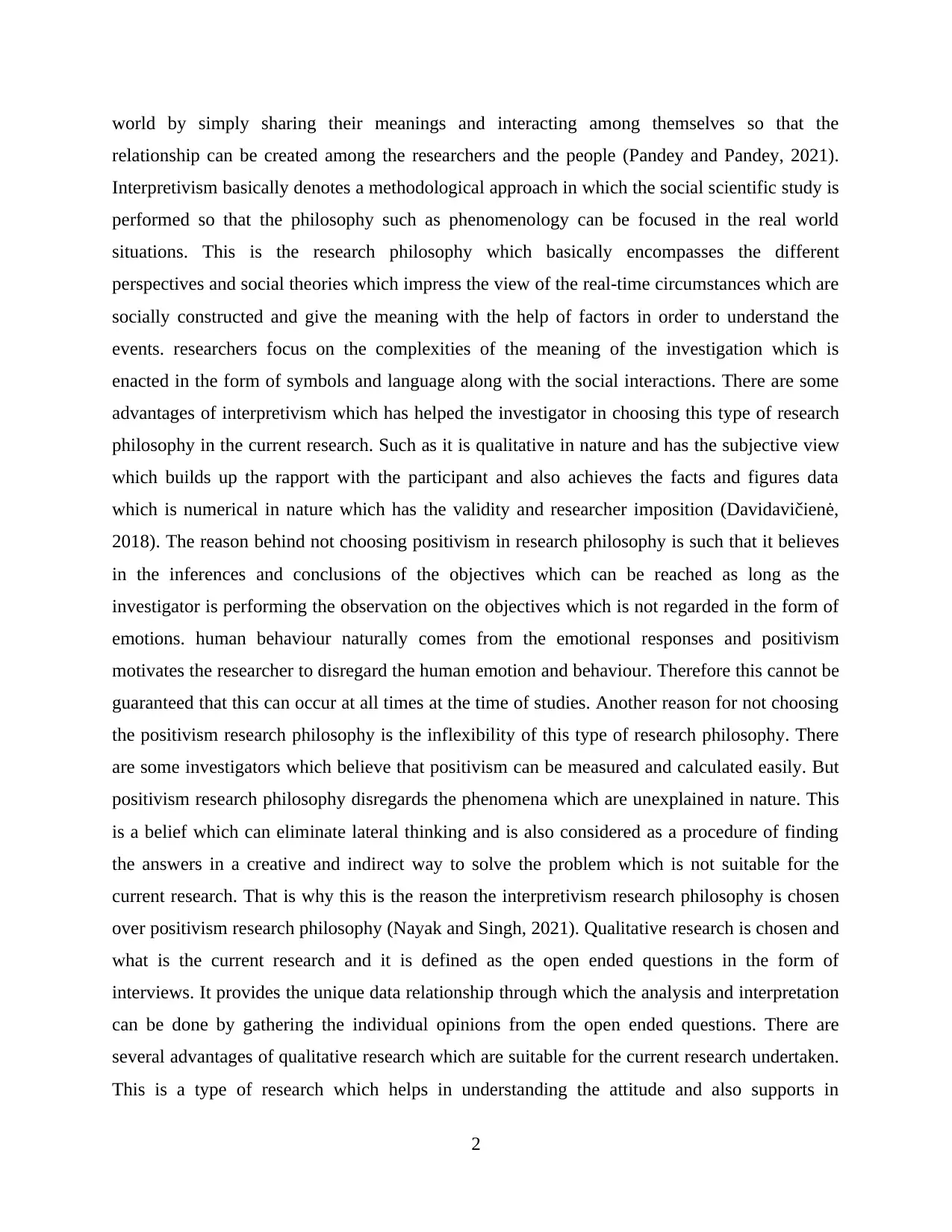
world by simply sharing their meanings and interacting among themselves so that the
relationship can be created among the researchers and the people (Pandey and Pandey, 2021).
Interpretivism basically denotes a methodological approach in which the social scientific study is
performed so that the philosophy such as phenomenology can be focused in the real world
situations. This is the research philosophy which basically encompasses the different
perspectives and social theories which impress the view of the real-time circumstances which are
socially constructed and give the meaning with the help of factors in order to understand the
events. researchers focus on the complexities of the meaning of the investigation which is
enacted in the form of symbols and language along with the social interactions. There are some
advantages of interpretivism which has helped the investigator in choosing this type of research
philosophy in the current research. Such as it is qualitative in nature and has the subjective view
which builds up the rapport with the participant and also achieves the facts and figures data
which is numerical in nature which has the validity and researcher imposition (Davidavičienė,
2018). The reason behind not choosing positivism in research philosophy is such that it believes
in the inferences and conclusions of the objectives which can be reached as long as the
investigator is performing the observation on the objectives which is not regarded in the form of
emotions. human behaviour naturally comes from the emotional responses and positivism
motivates the researcher to disregard the human emotion and behaviour. Therefore this cannot be
guaranteed that this can occur at all times at the time of studies. Another reason for not choosing
the positivism research philosophy is the inflexibility of this type of research philosophy. There
are some investigators which believe that positivism can be measured and calculated easily. But
positivism research philosophy disregards the phenomena which are unexplained in nature. This
is a belief which can eliminate lateral thinking and is also considered as a procedure of finding
the answers in a creative and indirect way to solve the problem which is not suitable for the
current research. That is why this is the reason the interpretivism research philosophy is chosen
over positivism research philosophy (Nayak and Singh, 2021). Qualitative research is chosen and
what is the current research and it is defined as the open ended questions in the form of
interviews. It provides the unique data relationship through which the analysis and interpretation
can be done by gathering the individual opinions from the open ended questions. There are
several advantages of qualitative research which are suitable for the current research undertaken.
This is a type of research which helps in understanding the attitude and also supports in
2
relationship can be created among the researchers and the people (Pandey and Pandey, 2021).
Interpretivism basically denotes a methodological approach in which the social scientific study is
performed so that the philosophy such as phenomenology can be focused in the real world
situations. This is the research philosophy which basically encompasses the different
perspectives and social theories which impress the view of the real-time circumstances which are
socially constructed and give the meaning with the help of factors in order to understand the
events. researchers focus on the complexities of the meaning of the investigation which is
enacted in the form of symbols and language along with the social interactions. There are some
advantages of interpretivism which has helped the investigator in choosing this type of research
philosophy in the current research. Such as it is qualitative in nature and has the subjective view
which builds up the rapport with the participant and also achieves the facts and figures data
which is numerical in nature which has the validity and researcher imposition (Davidavičienė,
2018). The reason behind not choosing positivism in research philosophy is such that it believes
in the inferences and conclusions of the objectives which can be reached as long as the
investigator is performing the observation on the objectives which is not regarded in the form of
emotions. human behaviour naturally comes from the emotional responses and positivism
motivates the researcher to disregard the human emotion and behaviour. Therefore this cannot be
guaranteed that this can occur at all times at the time of studies. Another reason for not choosing
the positivism research philosophy is the inflexibility of this type of research philosophy. There
are some investigators which believe that positivism can be measured and calculated easily. But
positivism research philosophy disregards the phenomena which are unexplained in nature. This
is a belief which can eliminate lateral thinking and is also considered as a procedure of finding
the answers in a creative and indirect way to solve the problem which is not suitable for the
current research. That is why this is the reason the interpretivism research philosophy is chosen
over positivism research philosophy (Nayak and Singh, 2021). Qualitative research is chosen and
what is the current research and it is defined as the open ended questions in the form of
interviews. It provides the unique data relationship through which the analysis and interpretation
can be done by gathering the individual opinions from the open ended questions. There are
several advantages of qualitative research which are suitable for the current research undertaken.
This is a type of research which helps in understanding the attitude and also supports in
2
Paraphrase This Document
Need a fresh take? Get an instant paraphrase of this document with our AI Paraphraser
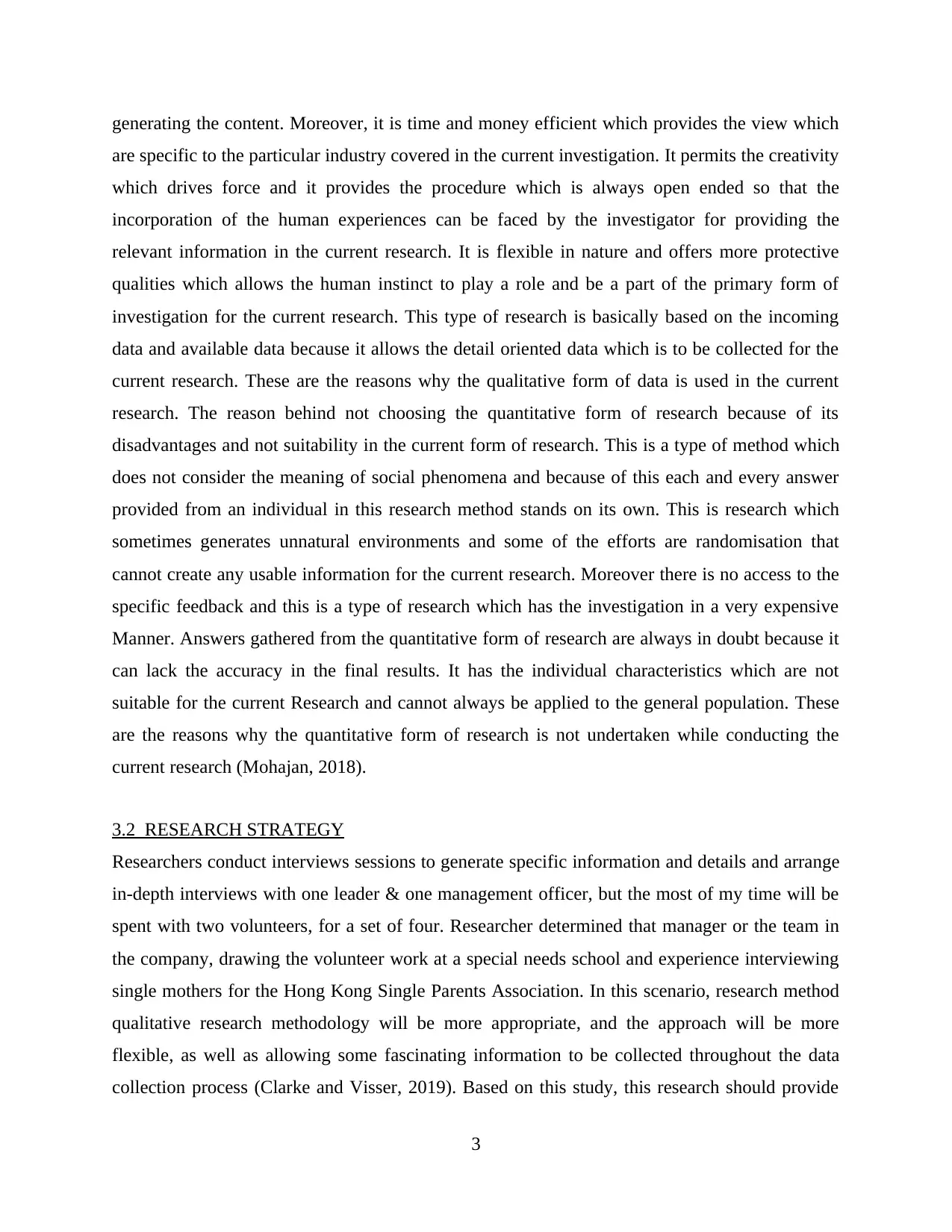
generating the content. Moreover, it is time and money efficient which provides the view which
are specific to the particular industry covered in the current investigation. It permits the creativity
which drives force and it provides the procedure which is always open ended so that the
incorporation of the human experiences can be faced by the investigator for providing the
relevant information in the current research. It is flexible in nature and offers more protective
qualities which allows the human instinct to play a role and be a part of the primary form of
investigation for the current research. This type of research is basically based on the incoming
data and available data because it allows the detail oriented data which is to be collected for the
current research. These are the reasons why the qualitative form of data is used in the current
research. The reason behind not choosing the quantitative form of research because of its
disadvantages and not suitability in the current form of research. This is a type of method which
does not consider the meaning of social phenomena and because of this each and every answer
provided from an individual in this research method stands on its own. This is research which
sometimes generates unnatural environments and some of the efforts are randomisation that
cannot create any usable information for the current research. Moreover there is no access to the
specific feedback and this is a type of research which has the investigation in a very expensive
Manner. Answers gathered from the quantitative form of research are always in doubt because it
can lack the accuracy in the final results. It has the individual characteristics which are not
suitable for the current Research and cannot always be applied to the general population. These
are the reasons why the quantitative form of research is not undertaken while conducting the
current research (Mohajan, 2018).
3.2 RESEARCH STRATEGY
Researchers conduct interviews sessions to generate specific information and details and arrange
in-depth interviews with one leader & one management officer, but the most of my time will be
spent with two volunteers, for a set of four. Researcher determined that manager or the team in
the company, drawing the volunteer work at a special needs school and experience interviewing
single mothers for the Hong Kong Single Parents Association. In this scenario, research method
qualitative research methodology will be more appropriate, and the approach will be more
flexible, as well as allowing some fascinating information to be collected throughout the data
collection process (Clarke and Visser, 2019). Based on this study, this research should provide
3
are specific to the particular industry covered in the current investigation. It permits the creativity
which drives force and it provides the procedure which is always open ended so that the
incorporation of the human experiences can be faced by the investigator for providing the
relevant information in the current research. It is flexible in nature and offers more protective
qualities which allows the human instinct to play a role and be a part of the primary form of
investigation for the current research. This type of research is basically based on the incoming
data and available data because it allows the detail oriented data which is to be collected for the
current research. These are the reasons why the qualitative form of data is used in the current
research. The reason behind not choosing the quantitative form of research because of its
disadvantages and not suitability in the current form of research. This is a type of method which
does not consider the meaning of social phenomena and because of this each and every answer
provided from an individual in this research method stands on its own. This is research which
sometimes generates unnatural environments and some of the efforts are randomisation that
cannot create any usable information for the current research. Moreover there is no access to the
specific feedback and this is a type of research which has the investigation in a very expensive
Manner. Answers gathered from the quantitative form of research are always in doubt because it
can lack the accuracy in the final results. It has the individual characteristics which are not
suitable for the current Research and cannot always be applied to the general population. These
are the reasons why the quantitative form of research is not undertaken while conducting the
current research (Mohajan, 2018).
3.2 RESEARCH STRATEGY
Researchers conduct interviews sessions to generate specific information and details and arrange
in-depth interviews with one leader & one management officer, but the most of my time will be
spent with two volunteers, for a set of four. Researcher determined that manager or the team in
the company, drawing the volunteer work at a special needs school and experience interviewing
single mothers for the Hong Kong Single Parents Association. In this scenario, research method
qualitative research methodology will be more appropriate, and the approach will be more
flexible, as well as allowing some fascinating information to be collected throughout the data
collection process (Clarke and Visser, 2019). Based on this study, this research should provide
3
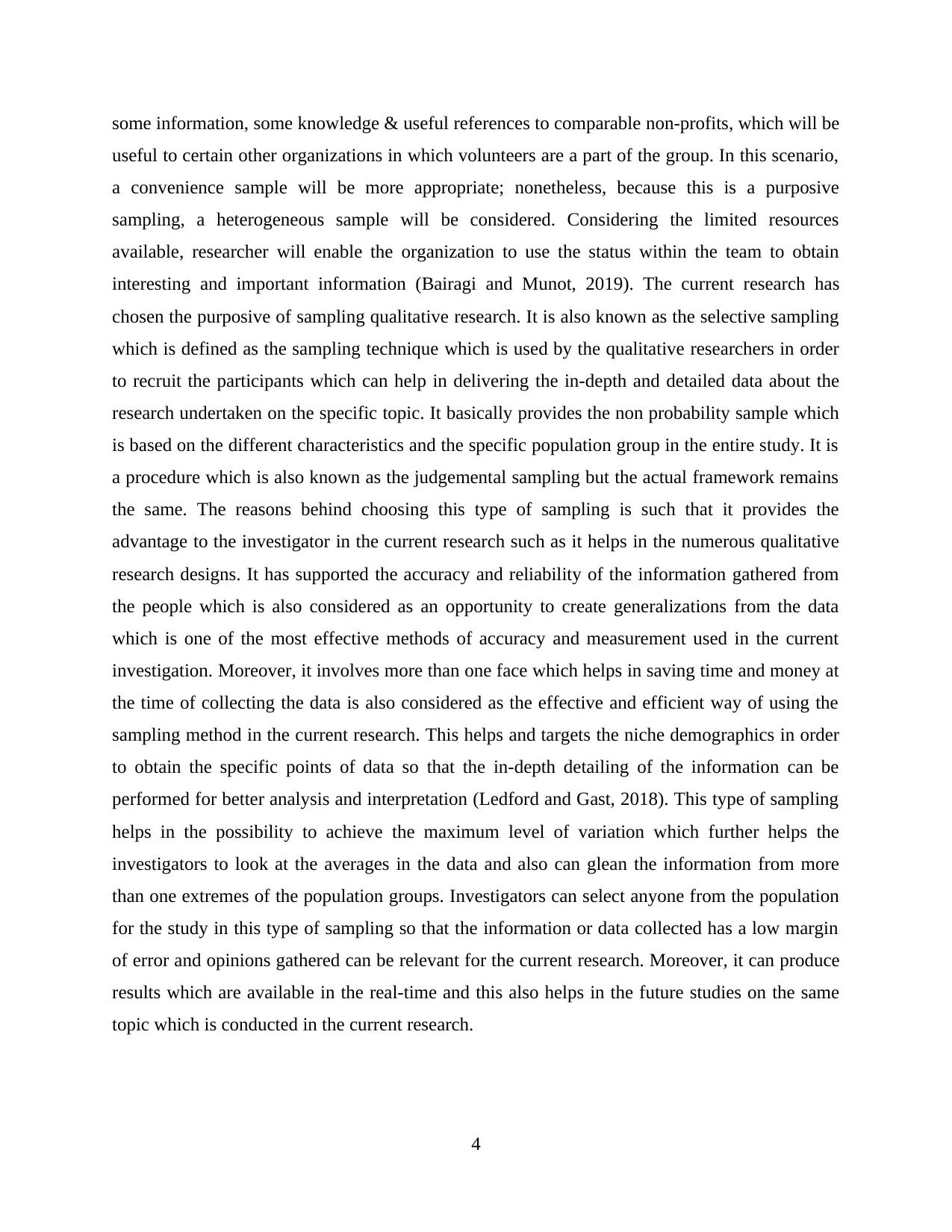
some information, some knowledge & useful references to comparable non-profits, which will be
useful to certain other organizations in which volunteers are a part of the group. In this scenario,
a convenience sample will be more appropriate; nonetheless, because this is a purposive
sampling, a heterogeneous sample will be considered. Considering the limited resources
available, researcher will enable the organization to use the status within the team to obtain
interesting and important information (Bairagi and Munot, 2019). The current research has
chosen the purposive of sampling qualitative research. It is also known as the selective sampling
which is defined as the sampling technique which is used by the qualitative researchers in order
to recruit the participants which can help in delivering the in-depth and detailed data about the
research undertaken on the specific topic. It basically provides the non probability sample which
is based on the different characteristics and the specific population group in the entire study. It is
a procedure which is also known as the judgemental sampling but the actual framework remains
the same. The reasons behind choosing this type of sampling is such that it provides the
advantage to the investigator in the current research such as it helps in the numerous qualitative
research designs. It has supported the accuracy and reliability of the information gathered from
the people which is also considered as an opportunity to create generalizations from the data
which is one of the most effective methods of accuracy and measurement used in the current
investigation. Moreover, it involves more than one face which helps in saving time and money at
the time of collecting the data is also considered as the effective and efficient way of using the
sampling method in the current research. This helps and targets the niche demographics in order
to obtain the specific points of data so that the in-depth detailing of the information can be
performed for better analysis and interpretation (Ledford and Gast, 2018). This type of sampling
helps in the possibility to achieve the maximum level of variation which further helps the
investigators to look at the averages in the data and also can glean the information from more
than one extremes of the population groups. Investigators can select anyone from the population
for the study in this type of sampling so that the information or data collected has a low margin
of error and opinions gathered can be relevant for the current research. Moreover, it can produce
results which are available in the real-time and this also helps in the future studies on the same
topic which is conducted in the current research.
4
useful to certain other organizations in which volunteers are a part of the group. In this scenario,
a convenience sample will be more appropriate; nonetheless, because this is a purposive
sampling, a heterogeneous sample will be considered. Considering the limited resources
available, researcher will enable the organization to use the status within the team to obtain
interesting and important information (Bairagi and Munot, 2019). The current research has
chosen the purposive of sampling qualitative research. It is also known as the selective sampling
which is defined as the sampling technique which is used by the qualitative researchers in order
to recruit the participants which can help in delivering the in-depth and detailed data about the
research undertaken on the specific topic. It basically provides the non probability sample which
is based on the different characteristics and the specific population group in the entire study. It is
a procedure which is also known as the judgemental sampling but the actual framework remains
the same. The reasons behind choosing this type of sampling is such that it provides the
advantage to the investigator in the current research such as it helps in the numerous qualitative
research designs. It has supported the accuracy and reliability of the information gathered from
the people which is also considered as an opportunity to create generalizations from the data
which is one of the most effective methods of accuracy and measurement used in the current
investigation. Moreover, it involves more than one face which helps in saving time and money at
the time of collecting the data is also considered as the effective and efficient way of using the
sampling method in the current research. This helps and targets the niche demographics in order
to obtain the specific points of data so that the in-depth detailing of the information can be
performed for better analysis and interpretation (Ledford and Gast, 2018). This type of sampling
helps in the possibility to achieve the maximum level of variation which further helps the
investigators to look at the averages in the data and also can glean the information from more
than one extremes of the population groups. Investigators can select anyone from the population
for the study in this type of sampling so that the information or data collected has a low margin
of error and opinions gathered can be relevant for the current research. Moreover, it can produce
results which are available in the real-time and this also helps in the future studies on the same
topic which is conducted in the current research.
4
⊘ This is a preview!⊘
Do you want full access?
Subscribe today to unlock all pages.

Trusted by 1+ million students worldwide
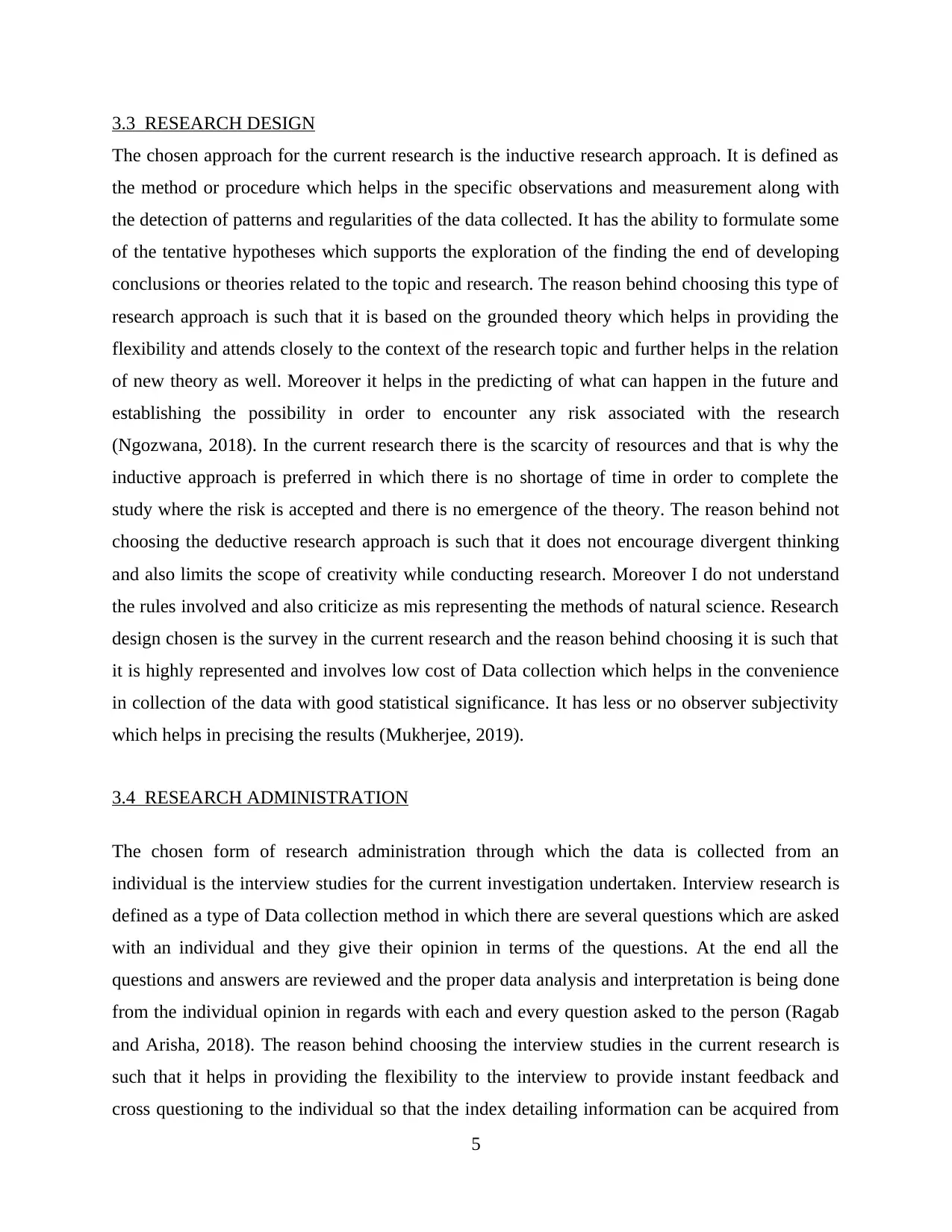
3.3 RESEARCH DESIGN
The chosen approach for the current research is the inductive research approach. It is defined as
the method or procedure which helps in the specific observations and measurement along with
the detection of patterns and regularities of the data collected. It has the ability to formulate some
of the tentative hypotheses which supports the exploration of the finding the end of developing
conclusions or theories related to the topic and research. The reason behind choosing this type of
research approach is such that it is based on the grounded theory which helps in providing the
flexibility and attends closely to the context of the research topic and further helps in the relation
of new theory as well. Moreover it helps in the predicting of what can happen in the future and
establishing the possibility in order to encounter any risk associated with the research
(Ngozwana, 2018). In the current research there is the scarcity of resources and that is why the
inductive approach is preferred in which there is no shortage of time in order to complete the
study where the risk is accepted and there is no emergence of the theory. The reason behind not
choosing the deductive research approach is such that it does not encourage divergent thinking
and also limits the scope of creativity while conducting research. Moreover I do not understand
the rules involved and also criticize as mis representing the methods of natural science. Research
design chosen is the survey in the current research and the reason behind choosing it is such that
it is highly represented and involves low cost of Data collection which helps in the convenience
in collection of the data with good statistical significance. It has less or no observer subjectivity
which helps in precising the results (Mukherjee, 2019).
3.4 RESEARCH ADMINISTRATION
The chosen form of research administration through which the data is collected from an
individual is the interview studies for the current investigation undertaken. Interview research is
defined as a type of Data collection method in which there are several questions which are asked
with an individual and they give their opinion in terms of the questions. At the end all the
questions and answers are reviewed and the proper data analysis and interpretation is being done
from the individual opinion in regards with each and every question asked to the person (Ragab
and Arisha, 2018). The reason behind choosing the interview studies in the current research is
such that it helps in providing the flexibility to the interview to provide instant feedback and
cross questioning to the individual so that the index detailing information can be acquired from
5
The chosen approach for the current research is the inductive research approach. It is defined as
the method or procedure which helps in the specific observations and measurement along with
the detection of patterns and regularities of the data collected. It has the ability to formulate some
of the tentative hypotheses which supports the exploration of the finding the end of developing
conclusions or theories related to the topic and research. The reason behind choosing this type of
research approach is such that it is based on the grounded theory which helps in providing the
flexibility and attends closely to the context of the research topic and further helps in the relation
of new theory as well. Moreover it helps in the predicting of what can happen in the future and
establishing the possibility in order to encounter any risk associated with the research
(Ngozwana, 2018). In the current research there is the scarcity of resources and that is why the
inductive approach is preferred in which there is no shortage of time in order to complete the
study where the risk is accepted and there is no emergence of the theory. The reason behind not
choosing the deductive research approach is such that it does not encourage divergent thinking
and also limits the scope of creativity while conducting research. Moreover I do not understand
the rules involved and also criticize as mis representing the methods of natural science. Research
design chosen is the survey in the current research and the reason behind choosing it is such that
it is highly represented and involves low cost of Data collection which helps in the convenience
in collection of the data with good statistical significance. It has less or no observer subjectivity
which helps in precising the results (Mukherjee, 2019).
3.4 RESEARCH ADMINISTRATION
The chosen form of research administration through which the data is collected from an
individual is the interview studies for the current investigation undertaken. Interview research is
defined as a type of Data collection method in which there are several questions which are asked
with an individual and they give their opinion in terms of the questions. At the end all the
questions and answers are reviewed and the proper data analysis and interpretation is being done
from the individual opinion in regards with each and every question asked to the person (Ragab
and Arisha, 2018). The reason behind choosing the interview studies in the current research is
such that it helps in providing the flexibility to the interview to provide instant feedback and
cross questioning to the individual so that the index detailing information can be acquired from
5
Paraphrase This Document
Need a fresh take? Get an instant paraphrase of this document with our AI Paraphraser
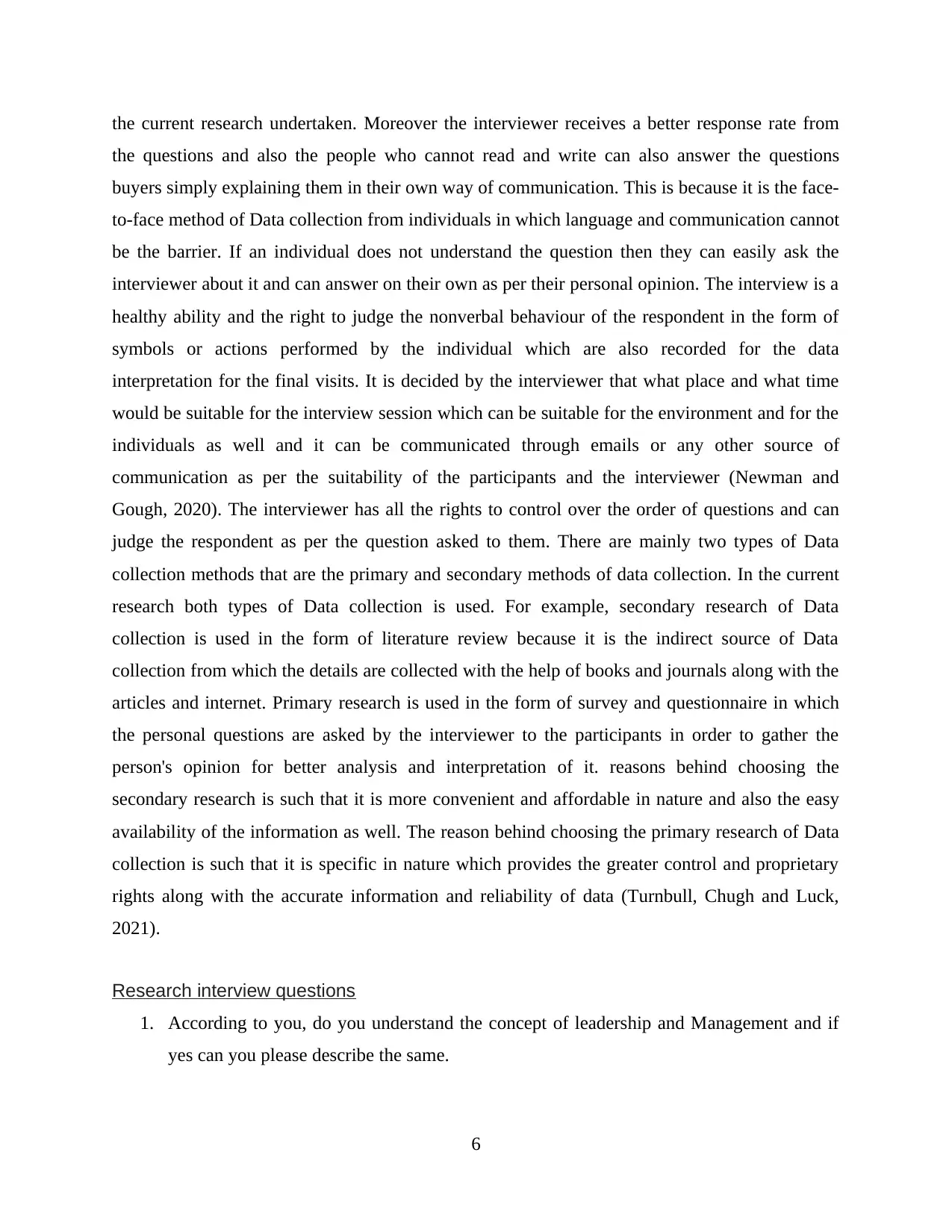
the current research undertaken. Moreover the interviewer receives a better response rate from
the questions and also the people who cannot read and write can also answer the questions
buyers simply explaining them in their own way of communication. This is because it is the face-
to-face method of Data collection from individuals in which language and communication cannot
be the barrier. If an individual does not understand the question then they can easily ask the
interviewer about it and can answer on their own as per their personal opinion. The interview is a
healthy ability and the right to judge the nonverbal behaviour of the respondent in the form of
symbols or actions performed by the individual which are also recorded for the data
interpretation for the final visits. It is decided by the interviewer that what place and what time
would be suitable for the interview session which can be suitable for the environment and for the
individuals as well and it can be communicated through emails or any other source of
communication as per the suitability of the participants and the interviewer (Newman and
Gough, 2020). The interviewer has all the rights to control over the order of questions and can
judge the respondent as per the question asked to them. There are mainly two types of Data
collection methods that are the primary and secondary methods of data collection. In the current
research both types of Data collection is used. For example, secondary research of Data
collection is used in the form of literature review because it is the indirect source of Data
collection from which the details are collected with the help of books and journals along with the
articles and internet. Primary research is used in the form of survey and questionnaire in which
the personal questions are asked by the interviewer to the participants in order to gather the
person's opinion for better analysis and interpretation of it. reasons behind choosing the
secondary research is such that it is more convenient and affordable in nature and also the easy
availability of the information as well. The reason behind choosing the primary research of Data
collection is such that it is specific in nature which provides the greater control and proprietary
rights along with the accurate information and reliability of data (Turnbull, Chugh and Luck,
2021).
Research interview questions
1. According to you, do you understand the concept of leadership and Management and if
yes can you please describe the same.
6
the questions and also the people who cannot read and write can also answer the questions
buyers simply explaining them in their own way of communication. This is because it is the face-
to-face method of Data collection from individuals in which language and communication cannot
be the barrier. If an individual does not understand the question then they can easily ask the
interviewer about it and can answer on their own as per their personal opinion. The interview is a
healthy ability and the right to judge the nonverbal behaviour of the respondent in the form of
symbols or actions performed by the individual which are also recorded for the data
interpretation for the final visits. It is decided by the interviewer that what place and what time
would be suitable for the interview session which can be suitable for the environment and for the
individuals as well and it can be communicated through emails or any other source of
communication as per the suitability of the participants and the interviewer (Newman and
Gough, 2020). The interviewer has all the rights to control over the order of questions and can
judge the respondent as per the question asked to them. There are mainly two types of Data
collection methods that are the primary and secondary methods of data collection. In the current
research both types of Data collection is used. For example, secondary research of Data
collection is used in the form of literature review because it is the indirect source of Data
collection from which the details are collected with the help of books and journals along with the
articles and internet. Primary research is used in the form of survey and questionnaire in which
the personal questions are asked by the interviewer to the participants in order to gather the
person's opinion for better analysis and interpretation of it. reasons behind choosing the
secondary research is such that it is more convenient and affordable in nature and also the easy
availability of the information as well. The reason behind choosing the primary research of Data
collection is such that it is specific in nature which provides the greater control and proprietary
rights along with the accurate information and reliability of data (Turnbull, Chugh and Luck,
2021).
Research interview questions
1. According to you, do you understand the concept of leadership and Management and if
yes can you please describe the same.
6
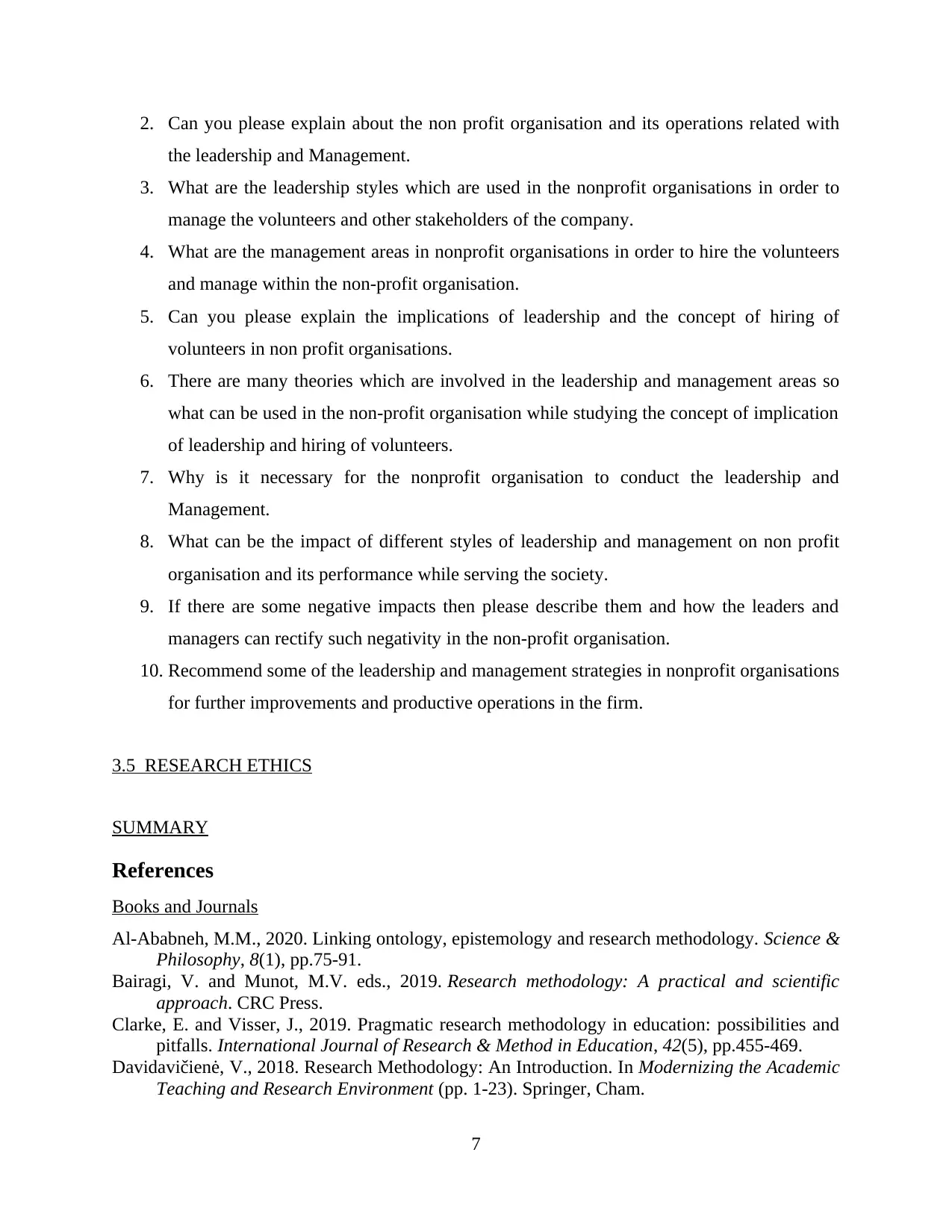
2. Can you please explain about the non profit organisation and its operations related with
the leadership and Management.
3. What are the leadership styles which are used in the nonprofit organisations in order to
manage the volunteers and other stakeholders of the company.
4. What are the management areas in nonprofit organisations in order to hire the volunteers
and manage within the non-profit organisation.
5. Can you please explain the implications of leadership and the concept of hiring of
volunteers in non profit organisations.
6. There are many theories which are involved in the leadership and management areas so
what can be used in the non-profit organisation while studying the concept of implication
of leadership and hiring of volunteers.
7. Why is it necessary for the nonprofit organisation to conduct the leadership and
Management.
8. What can be the impact of different styles of leadership and management on non profit
organisation and its performance while serving the society.
9. If there are some negative impacts then please describe them and how the leaders and
managers can rectify such negativity in the non-profit organisation.
10. Recommend some of the leadership and management strategies in nonprofit organisations
for further improvements and productive operations in the firm.
3.5 RESEARCH ETHICS
SUMMARY
References
Books and Journals
Al-Ababneh, M.M., 2020. Linking ontology, epistemology and research methodology. Science &
Philosophy, 8(1), pp.75-91.
Bairagi, V. and Munot, M.V. eds., 2019. Research methodology: A practical and scientific
approach. CRC Press.
Clarke, E. and Visser, J., 2019. Pragmatic research methodology in education: possibilities and
pitfalls. International Journal of Research & Method in Education, 42(5), pp.455-469.
Davidavičienė, V., 2018. Research Methodology: An Introduction. In Modernizing the Academic
Teaching and Research Environment (pp. 1-23). Springer, Cham.
7
the leadership and Management.
3. What are the leadership styles which are used in the nonprofit organisations in order to
manage the volunteers and other stakeholders of the company.
4. What are the management areas in nonprofit organisations in order to hire the volunteers
and manage within the non-profit organisation.
5. Can you please explain the implications of leadership and the concept of hiring of
volunteers in non profit organisations.
6. There are many theories which are involved in the leadership and management areas so
what can be used in the non-profit organisation while studying the concept of implication
of leadership and hiring of volunteers.
7. Why is it necessary for the nonprofit organisation to conduct the leadership and
Management.
8. What can be the impact of different styles of leadership and management on non profit
organisation and its performance while serving the society.
9. If there are some negative impacts then please describe them and how the leaders and
managers can rectify such negativity in the non-profit organisation.
10. Recommend some of the leadership and management strategies in nonprofit organisations
for further improvements and productive operations in the firm.
3.5 RESEARCH ETHICS
SUMMARY
References
Books and Journals
Al-Ababneh, M.M., 2020. Linking ontology, epistemology and research methodology. Science &
Philosophy, 8(1), pp.75-91.
Bairagi, V. and Munot, M.V. eds., 2019. Research methodology: A practical and scientific
approach. CRC Press.
Clarke, E. and Visser, J., 2019. Pragmatic research methodology in education: possibilities and
pitfalls. International Journal of Research & Method in Education, 42(5), pp.455-469.
Davidavičienė, V., 2018. Research Methodology: An Introduction. In Modernizing the Academic
Teaching and Research Environment (pp. 1-23). Springer, Cham.
7
⊘ This is a preview!⊘
Do you want full access?
Subscribe today to unlock all pages.

Trusted by 1+ million students worldwide
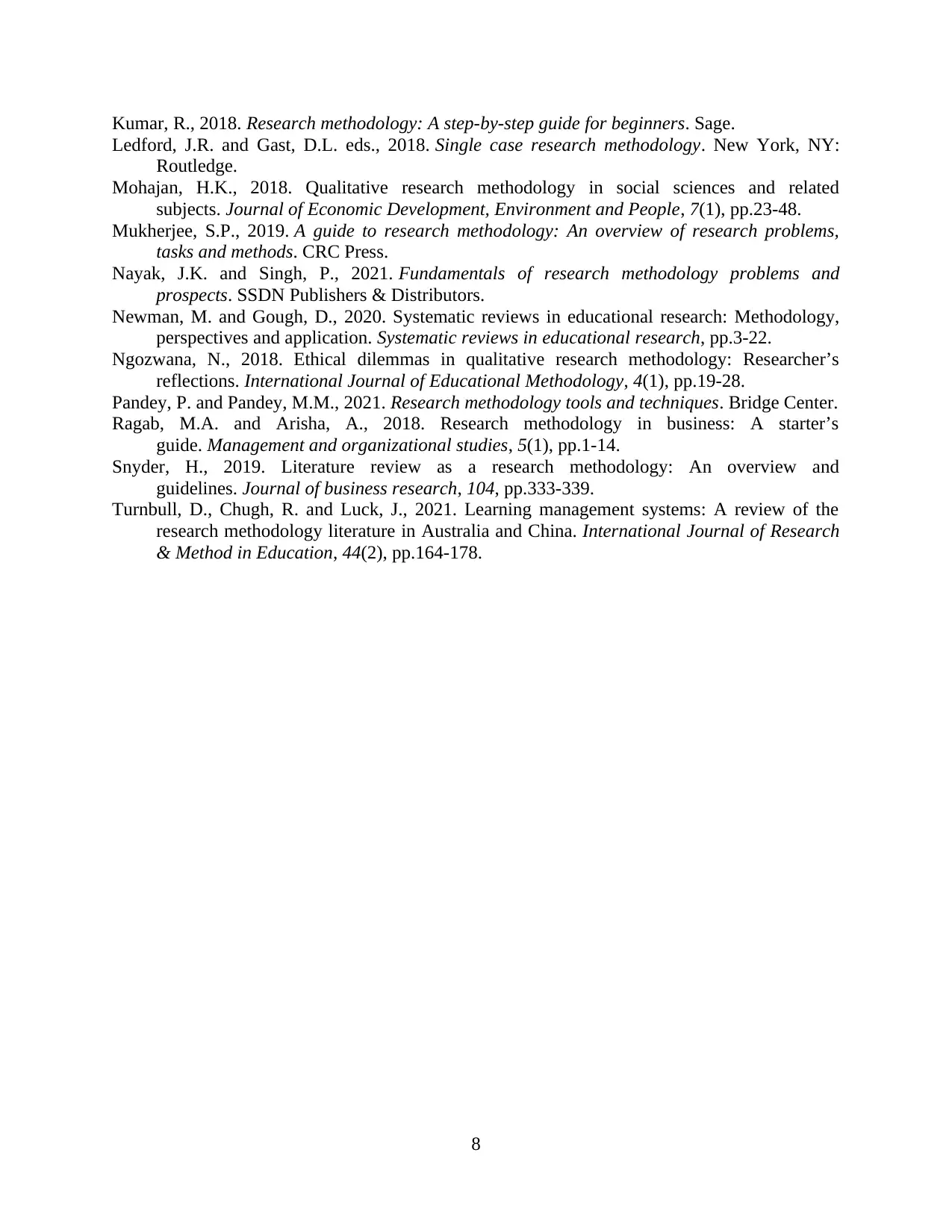
Kumar, R., 2018. Research methodology: A step-by-step guide for beginners. Sage.
Ledford, J.R. and Gast, D.L. eds., 2018. Single case research methodology. New York, NY:
Routledge.
Mohajan, H.K., 2018. Qualitative research methodology in social sciences and related
subjects. Journal of Economic Development, Environment and People, 7(1), pp.23-48.
Mukherjee, S.P., 2019. A guide to research methodology: An overview of research problems,
tasks and methods. CRC Press.
Nayak, J.K. and Singh, P., 2021. Fundamentals of research methodology problems and
prospects. SSDN Publishers & Distributors.
Newman, M. and Gough, D., 2020. Systematic reviews in educational research: Methodology,
perspectives and application. Systematic reviews in educational research, pp.3-22.
Ngozwana, N., 2018. Ethical dilemmas in qualitative research methodology: Researcher’s
reflections. International Journal of Educational Methodology, 4(1), pp.19-28.
Pandey, P. and Pandey, M.M., 2021. Research methodology tools and techniques. Bridge Center.
Ragab, M.A. and Arisha, A., 2018. Research methodology in business: A starter’s
guide. Management and organizational studies, 5(1), pp.1-14.
Snyder, H., 2019. Literature review as a research methodology: An overview and
guidelines. Journal of business research, 104, pp.333-339.
Turnbull, D., Chugh, R. and Luck, J., 2021. Learning management systems: A review of the
research methodology literature in Australia and China. International Journal of Research
& Method in Education, 44(2), pp.164-178.
8
Ledford, J.R. and Gast, D.L. eds., 2018. Single case research methodology. New York, NY:
Routledge.
Mohajan, H.K., 2018. Qualitative research methodology in social sciences and related
subjects. Journal of Economic Development, Environment and People, 7(1), pp.23-48.
Mukherjee, S.P., 2019. A guide to research methodology: An overview of research problems,
tasks and methods. CRC Press.
Nayak, J.K. and Singh, P., 2021. Fundamentals of research methodology problems and
prospects. SSDN Publishers & Distributors.
Newman, M. and Gough, D., 2020. Systematic reviews in educational research: Methodology,
perspectives and application. Systematic reviews in educational research, pp.3-22.
Ngozwana, N., 2018. Ethical dilemmas in qualitative research methodology: Researcher’s
reflections. International Journal of Educational Methodology, 4(1), pp.19-28.
Pandey, P. and Pandey, M.M., 2021. Research methodology tools and techniques. Bridge Center.
Ragab, M.A. and Arisha, A., 2018. Research methodology in business: A starter’s
guide. Management and organizational studies, 5(1), pp.1-14.
Snyder, H., 2019. Literature review as a research methodology: An overview and
guidelines. Journal of business research, 104, pp.333-339.
Turnbull, D., Chugh, R. and Luck, J., 2021. Learning management systems: A review of the
research methodology literature in Australia and China. International Journal of Research
& Method in Education, 44(2), pp.164-178.
8
1 out of 10
Related Documents
Your All-in-One AI-Powered Toolkit for Academic Success.
+13062052269
info@desklib.com
Available 24*7 on WhatsApp / Email
![[object Object]](/_next/static/media/star-bottom.7253800d.svg)
Unlock your academic potential
Copyright © 2020–2025 A2Z Services. All Rights Reserved. Developed and managed by ZUCOL.





